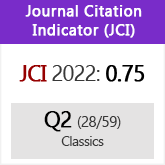Parallelism in Plautus
DOI:
https://doi.org/10.3989/emerita.1985.v53.i1.688Abstract
This article begins by noting that in classical Hebrew poetry there is parallelism of three distinct kinds which were first discussed by Robert Lowth in 1753: synonymous parallelism (the commonest type), consisting in the simple repetition of the same thought in slightly different words; antithetical parallelism, produced by contrasting the first member with the second; synthetic parallelism, in which the first member is developed or completed by a similar thought in the second (or third, when it is triplets which are in question). This phenomenon of Hebrew poetry is found frequently in early Latin poetry but has not yet been specifically recognised. The article examines two plays by Plautus and quotes numerous other instances at large from archaic Latin poets to establish the point.
Downloads
Download data is not yet available.
Downloads
Published
1985-06-30
How to Cite
MacL. Currie, H. (1985). Parallelism in Plautus. Emerita, 53(1), 81–91. https://doi.org/10.3989/emerita.1985.v53.i1.688
Issue
Section
Articles
License
Copyright (c) 1985 Consejo Superior de Investigaciones Científicas (CSIC)

This work is licensed under a Creative Commons Attribution 4.0 International License.
© CSIC. Manuscripts published in both the printed and online versions of this Journal are the property of Consejo Superior de Investigaciones Científicas, and quoting this source is a requirement for any partial or full reproduction.All contents of this electronic edition, except where otherwise noted, are distributed under a “Creative Commons Attribution 4.0 International” (CC BY 4.0) License. You may read here the basic information and the legal text of the license. The indication of the CC BY 4.0 License must be expressly stated in this way when necessary.
Self-archiving in repositories, personal webpages or similar, of any version other than the published by the Editor, is not allowed.














